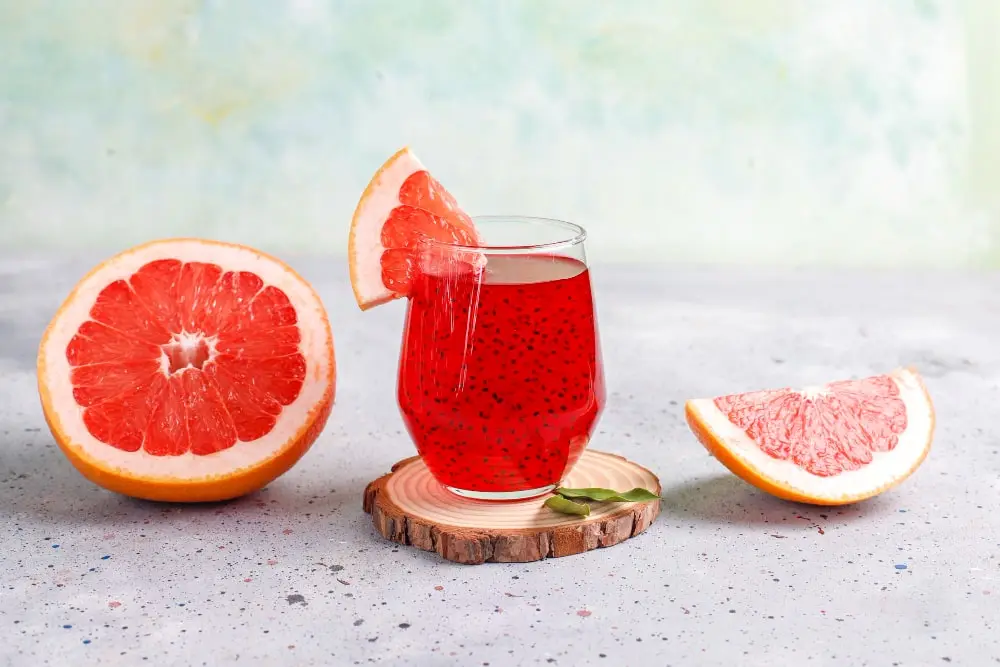How Long Does Grapefruit Juice Last?

Grapefruit juice is a liquid beverage made from the extraction or squeezing of grapefruits, and citrus fruits from the Rutaceae family. Grapefruit juice is loved for its vibrant flavor and health benefits, but knowing how long it stays fresh is a game changer.
Nothing ruins your morning more than reaching for your juice, only to find it’s gone bad. Whether you are sipping store-bought or homemade, understanding the shelf life of grapefruit juice is key to enjoying its tangy goodness safely.
Curious about how to maximize its freshness? Or how to spot the signs of spoilage? You are in the right place. From proper storage techniques to knowing when it’s time to toss, we have everything you need to keep your juice as fresh and tasty as the day you opened it.
Understanding Factors Influencing Shelf Life of Grapefruit Juice
The shelf life of grapefruit juice is influenced by various factors that impact its freshness, flavor, and overall quality. Understanding these factors can help consumers make informed choices about storage and consumption.
Here are key factors that influence the shelf life of grapefruit juice:
1. Processing Methods
Freshly squeezed grapefruit juice may have a shorter shelf life due to the presence of natural enzymes. In contrast, commercially processed juices often undergo pasteurization or other preservation methods to extend longevity.
2. Storage Conditions
Proper refrigeration is crucial. Exposure to air and light can accelerate oxidation and degradation.
Storing in opaque or dark-colored containers helps protect the juice from harmful UV rays.
3. Additives and Preservatives
Some grapefruit juices include additives or preservatives, like citric acid or sodium benzoate, to prevent spoilage and extend shelf life.
Checking the product label for information on additives and preservatives is essential when purchasing grapefruit juice. Consumers can choose products based on their preferences for natural or preserved options.
4. Types of Packaging
The type of packaging can impact shelf life. Glass containers offer better protection against light and oxygen compared to plastic. Airtight seals are essential to prevent contamination.
5. Exposure to Air
Air exposure can lead to oxidation, which degrades the juice. Keeping the juice in airtight containers helps maintain its freshness.
How Long Does Grapefruit Juice Last?
The shelf life of grapefruit juice can vary based on several factors, including the processing method, storage conditions, and the presence of additives or preservatives.
Here are the general guidelines:
1. Unopened Store-Bought Grapefruit Juice
Unopened store-bought grapefruit juice typically has a long shelf life due to pasteurization and preservatives.
You will often find an expiration printed on the packaging. Most brands remain fresh for 6-12 months when kept at room temperature or in a cool, dark pantry.
2. Opened Store-Bought Grapefruit Juice
Once opened, grapefruit juice should be refrigerated immediately. When properly stored in the fridge, opened juice typically lasts for 7-10 days.

The clock starts ticking as soon as you break the seal, so make sure you pour and store carefully to avoid contamination.
3. Homemade Grapefruit Juice
Homemade grapefruit juice has no preservatives, so it spoils much faster than its store-bought counterpart.
If refrigerated, freshly squeezed juice can stay fresh for about 2-3 days. After this, it begins to lose its flavor, nutrients, and safe-to-drink status.
How to Know If Grapefruit Juice Is Bad: A Quick Guide
Grapefruit juice is a delicious and healthy addition to your diet, but like all perishable foods, it can go bad.
Drinking spoiled juice can also pose a risk to your health. However, it’s essential to understand the signs of grapefruit juice spoilage.
Here are the key indicators to tell if your grapefruit juice has turned:
1. Unpleasant Smell
Fresh grapefruit juice has a bright, citrusy aroma. If it smells sour, rancid, or like vinegar, it’s likely gone bad.
A foul odor is one of the clearest signs of spoilage.
2. Off Taste
A taste test can confirm if your juice is still good. Spoiled grapefruit juice may taste overly sour, bitter, or just “off.” If it doesn’t taste right, it’s best to discard it.
3. Changes in Texture
Fresh juice is smooth and fluid. If the texture changes, like becoming thick, slimy, or separating and not mixing back together, it’s a red flag.
4. Cloudiness or Sediment
While some sediment can occur naturally in juice, excessive, unusual cloudiness or separation may indicate spoilage. Take a closer look if the juice appears murky or different than usual.
5. Color Changes
Fresh grapefruit juice typically has a consistent pink or orange hue. If it turns darker, dull, or takes on an unusual shade, it’s time to throw it out.
By keeping these signs of bad grapefruit juice in mind, you will stay safe and enjoy your juice at its best!
What Happens If You Drink Spoiled Grapefruit Juice?
Consuming spoiled grapefruit juice can pose health risks and lead to various adverse effects. Spoilage in juice can occur due to the growth of bacteria, mold, or yeast, leading to changes in taste, odor, color, and texture.
Here are the potential consequences of drinking spoiled grapefruit juice:
1. Stomach Upset
Grapefruit juice that’s gone bad can wreak havoc on your digestive system. Symptoms like cramps, bloating, or general discomfort in your stomach can develop shortly after drinking it.
These signs indicate your body is working hard to expel the harmful contents.
2. Nausea and Vomiting
The sour, off-putting taste and smell of spoiled juice can trigger nausea almost immediately.
Vomiting may follow as your body attempts to get rid of the ingested bacteria or fermenting juice contents.
3. Food Poisoning
Bacterial contamination, especially by pathogens like Salmonella or E. coli, can lead to food poisoning. Symptoms may include fever, abdominal pain, and more severe gastrointestinal issues.
4. Allergic Reactions
Mold growth in spoiled juice can produce mycotoxins, which may trigger allergic reactions in sensitive individuals. Symptoms may range from mild itching or swelling to more severe respiratory distress.
Frequently Asked Question
Can I extend the shelf life of homemade grapefruit juice?
How long does commercially processed grapefruit juice last after opening?
Conclusion
Grapefruit juice is a delicious and nutritious drink, but it doesn’t last forever. Understanding its shelf life, recognizing signs of spoilage, and storing it properly can help you enjoy it at its best.
Whether you are freezing it or using it in creative recipes, make the most of your juice before it goes bad.